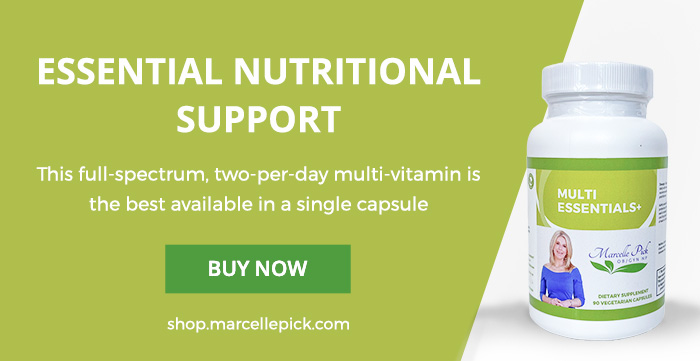Updated 03/19/2023
Like so many women I see, Kara was increasingly frustrated with her weight loss efforts. She’d tried everything, she said, with no results. In fact, she had gained weight – even when eating so little that she was hungry all the time.
When I told Kara I wanted to test her for small intestinal bacterial overgrowth (SIBO) she looked confused.
She said someone had mentioned this to her before, so she’d asked her doctor about it, and was told that people with SIBO lose weight, not gain.
While it’s true that a symptom of SIBO can be rapid, unhealthy weight loss due to malnutrition (as bacteria robs the body of important nutrients), SIBO can manifest differently in different people.
Beyond malnutrition, the gut microbiome disruption that occurs with SIBO can lead to a slower metabolism, hormonal imbalances, and weight loss resistance.
When I talked to Kara more, I discovered that difficulty losing weight wasn’t her only problem. She’d had constipation and digestive pain, bloating, fatigue, and she said her joints ached more often than not. She said she’d been dealing with these issues for years. Weren’t they normal struggles that she had to just live with?
The answer is absolutely not! These symptoms are a sign, a call for help from your body. The trick, since they are common symptoms for multiple conditions, is determining what’s actually causing them. In Kara’s case, I thought the underlying problem was SIBO. As it turns out, I was right!
Once we knew what we were dealing with, I could make clear recommendations on how Kara could balance the bacteria in her digestive system and return to a life free from uncomfortable symptoms.
Let’s take a look at what SIBO is, what causes it, and available tests that can help you pinpoint the problem. Then I’ll give you my best strategies for balancing the gut naturally so you, too, can be free of symptoms – and finally see results on the weight loss front too!
What is SIBO?
Nearly ¾ of Americans experience digestive difficulties such as gas, bloating, constipation or diarrhea, or pain in the abdominal region. Often, SIBO is either the root cause or a major contributing factor in these symptoms as well as in diagnosed digestive diseases.
Research has also shown that SIBO impacts other diseases like diabetes, hypothyroidism, fibromyalgia, neurological diseases, and obesity – none of which seem to have anything to do with digestion!
Small Intestinal Bacterial Overgrowth (SIBO) is exactly what it sounds like: an overgrowth of bacteria or fungus in the small intestine. This may include harmful types of bacteria and microbes, as well as perfectly normal types of bacteria that just aren’t supposed to be so abundant in this part of your digestive tract.
There are a wide range of symptoms that could indicate SIBO is a problem for you. These include:
- Always feeling full or getting full quickly when eating a meal
- Bloating
- Nausea or heartburn
- Diarrhea or constipation
- Anxiety, irritability, restlessness, mood swings or depression
- Fatigue, lethargy
- Memory issues
- Skin problems such as hive, acne, rashes, or eczema
- Congestion, asthma, or shortness of breath
Of course, as I said before, these symptoms are common in a number of health conditions. But if you have several, it’s likely you have gut imbalances that need to be dealt with. Correcting these issues will go a long way in getting you on the right path in your weight loss journey.
What causes SIBO?
SIBO is just one example of the dysbiosis that can occur in the gut. Dysbiosis means that the bacteria present in your digestive system is out of balance. While you need bacteria in your system, proper balance (symbiosis) is essential for optimal health.
To best maintain that balance, it’s important to understand what disrupts it. There are many factors that lead to dysbiosis, including SIBO. Some of the most common are food poisoning, chronic antibiotic use, viral or parasitic infection, trauma (both physical and emotional), surgery, and lifestyle factors, like chronic stress, or eating poorly.
Immune suppression and inflammation can also impact the balance of bacteria. Unidentified food sensitivities can also be a factor (but they can also be caused by dysbiosis).
How is SIBO Connected to Weight Loss Resistance?
SIBO is, simply put, one type of disruption in the balance of your gut microbiome. And your gut bacteria have the power to influence all kinds of things related to weight, from hormonal balance and nutrient absorption to blood sugar levels and metabolism.
In other words, an imbalanced gut can mean lack of control over your weight and numerous other aspects of your health.
When your body is dealing with overgrowth of bacteria it also has to deal with the byproducts of this bacteria. SIBO can lead to excess production of hydrogen, methane, or, more newly recognized, hydrogen sulfide (and some organisms convert hydrogen to methane, exacerbating the issue).
Research has linked methane production to constipation and irritable bowel syndrome and obesity. Methane production is associated with slow transit time, meaning food hangs out in the gut for far too long, causing multiple issues – weight gain among them. Those who produce too much methane may also be deriving more calories than others from the food they eat.
SIBO can also lead to a sluggish metabolism that impacts leptin and insulin levels, which regulate hunger and satiety (feeling full). Consider all of these factors together, and it’s no wonder you may be having trouble losing weight!
Testing for SIBO
Now that you know how many ways SIBO can impact your health, if you are dealing with similar issues, testing probably seems like a good next step.
Breath testing is an easy, non-invasive test that measures the amount of hydrogen or methane you breathe out after drinking a glucose or lactulose and water solution. If exhaled hydrogen or methane rises quickly, this may indicate bacterial overgrowth in the small intestine. One drawback, however, is that breath tests can be less specific than other tests.
The “gold standard” test for bacterial overgrowth, according to the Mayo Clinic, is a small intestine aspirate and fluid culture. This test takes a fluid sample using an endoscope which is then sent to a lab to test bacterial growth.
Blood tests may be recommended to test for nutrient deficiencies. A comprehensive digestive stool analysis (CDSA) evaluates digestive system function, fat absorption, bacterial or yeast infection, gut flora balance, intestinal immune function, and dietary fiber intake.
Testing for food sensitivities can also be useful, though an elimination diet can also provide important information about how your body reacts to common allergens. Some of the tests that you might consider are IgG RAST to test for intolerances to specific foods; a celiac panel and genetic testing to evaluate gluten intolerance; organic acids; and intestinal permeability testing.
Strategies to combat SIBO
The tips I offer here are useful for naturally addressing any dysbiosis in the gut. When your gut flora is properly balanced throughout the digestive tract you will be far more likely to achieve good health – gut health and weight loss included.
Eat for a balanced gut
I always start with the food you consume. That’s because it’s SO important. The acronym for Standard American Diet is SAD. That’s apt, I think. It certainly is sad when our body doesn’t get the nutrients it needs. And when you’re consuming primarily processed convenience foods filled with artificial ingredients and sugar, you definitely aren’t getting essential nutrients!
That’s why I always suggest cutting back on (or eliminating entirely) processed foods, and focusing on organic whole foods as much as possible.
Sugar feeds harmful bacteria, parasites, yeast and fungi. To get rid of them, they need to starve. That means you may need to eliminate sugar entirely, at least for a short period of time.
Starchy foods convert to sugar quickly, so those may need to go too. But it’s not forever (though I always promote moderation when it comes to sugar, which can cause myriad health problems).
Just as there are things that make things worse, there are options that can help beneficial bacteria grow. Foods that naturally contain probiotics, like kefir, sauerkraut, kimchi, and kombucha can make a big difference.
But you may need to avoid prebiotic foods– for now
There’s a sort of paradox about SIBO that can sometimes confuse people: certain foods and supplements that are touted for their gut-benefiting properties can actually make SIBO worse.
Namely, these are prebiotic foods: foods that feed healthy gut bacteria. Some examples include bananas, garlic, dandelion greens, asparagus, and onions.
The problem for those with SIBO, of course, is that they have an overgrowth of bacteria in the small intestine. So feeding these microbes can actually exacerbate the problem.
This is why it’s best to avoid prebiotic foods when you have SIBO. But keep in mind that once the overgrowth has been resolved, you’ll likely be able to enjoy these nutritious foods again.
High quality supplementation
Even when you eat well, your system may need a little help, especially early in the healing process. A high quality probiotic, like my proprietary Biotic Support formula, can give the beneficial flora just the boost it needs. Just be sure that whatever formula you choose has the specific bacteria you need.
You may also need to repair damage by boosting other key nutrients that calm inflammation and aid your digestive system in healing. These include zinc, vitamins A, C and E (all powerful antioxidants), fish oil which supplies essential fatty acids, and glutamine.
A high-quality multivitamin can provide many of these nutrients in one nutrient packed supplement. I recommend every woman add this to their daily routine – especially if gut health is poor.
Attend to emotional upsets
Chronic emotional upset leads to chronic stress, which leads to a host of health problems, including dysbiosis. Letting go of old hurts can move the healing process forward much more quickly than refusing to consider how past trauma is impacting your present health. This can be a painful process, so seek out professional help if necessary.
Stress relief is essential
Stress comes from so many directions – the food we eat, our emotional state, the crazy pace we try to keep up with. It may seem like it’s impossible to reduce this stress, but when you intentionally address it, you will see how important it is to continue doing so! You won’t be able to eliminate stress entirely – and in fact, you wouldn’t want to! Your body’s stress response is an important part of survival. The key is to recognize what is a true threat – and what isn’t.
Small steps toward reducing stress, like a few deep breaths, learning how to say “no” to requests, taking time out for daily meditation or exercise, and finding some joy in each and every day can make a huge difference.
Herbal remedies
I often use herbs as a first course of action when SIBO is the problem. Many of my patients have experienced great relief using a specific combination of herbs. Not only are these a natural solution, but they’re often much less expensive than antibiotics (which can make the problem worse, not better).
Choose products intentionally
We are under constant assault from environmental toxins. While we can’t avoid all of them, there are plenty of choices we make every day that can have a positive impact. Research the beauty and cleaning products you use thoroughly to find the most natural options. Filter your water and try to buy organic foods to reduce the amount of pesticides you consume.
Address SIBO to feel great and lose weight
Weight loss might be what brings women like Kara to me, but the way they feel when I take the time to address the actual issues, not just the symptoms, keeps them coming back. Getting SIBO under control is a critical first step in the quest for a healthy life.
Once the SIBO is under control, learning how to make healthier choices and nurture balance can keep you feeling great. And when you feel great, you’ll be much more likely to keep taking the steps that have a positive impact on your health – including weight!








